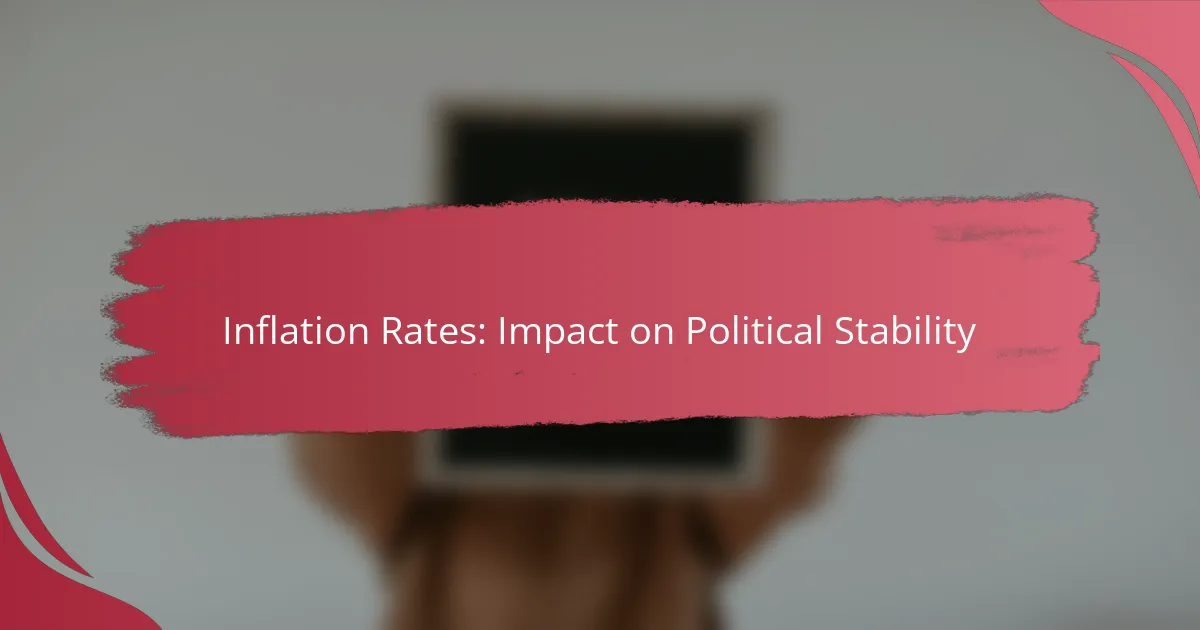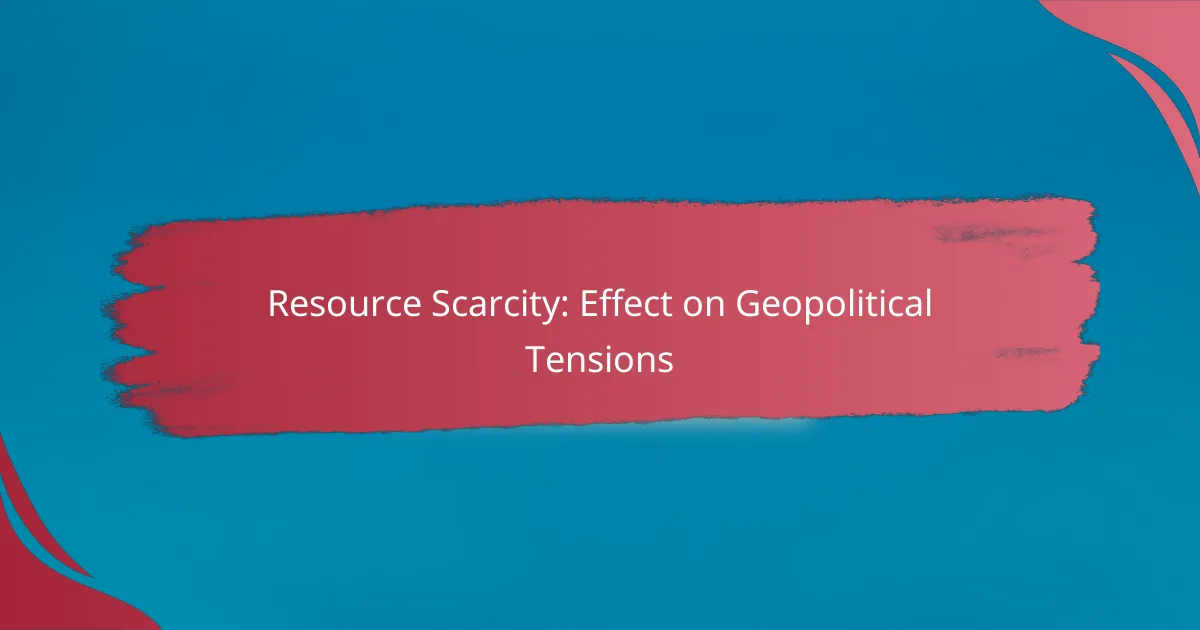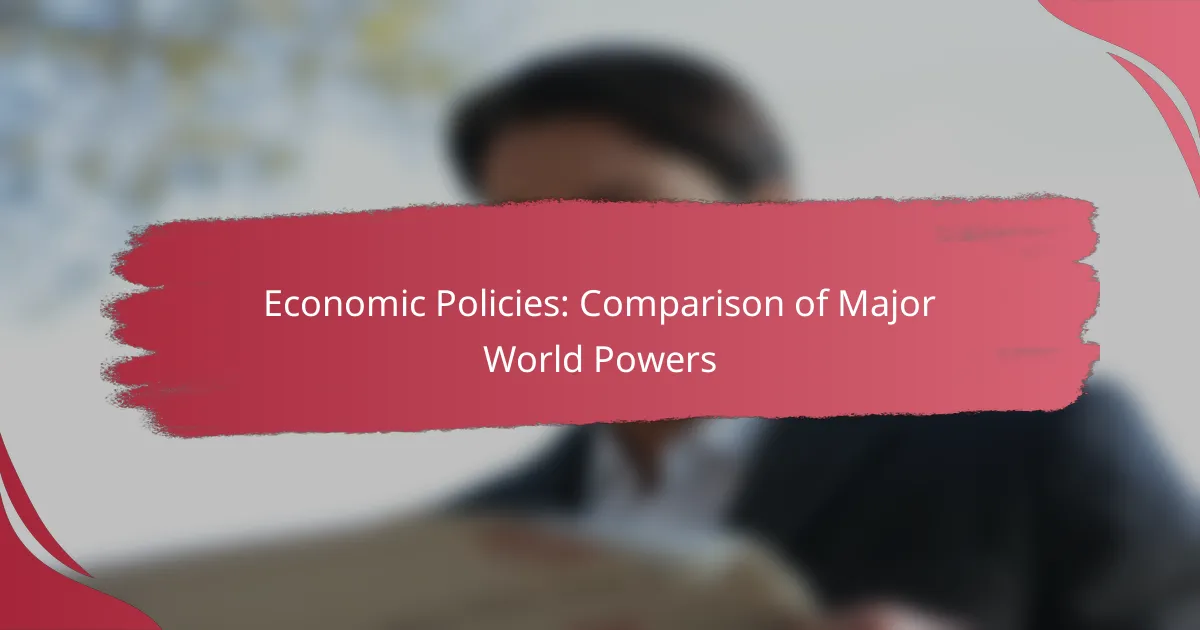Inflation rates play a crucial role in shaping political stability by affecting economic conditions and social trust in government institutions. As inflation rises, it can lead to increased uncertainty and unrest, undermining the legitimacy of governing bodies. With current inflation rates fluctuating due to various global factors, understanding this relationship is essential for maintaining stability in nations worldwide.
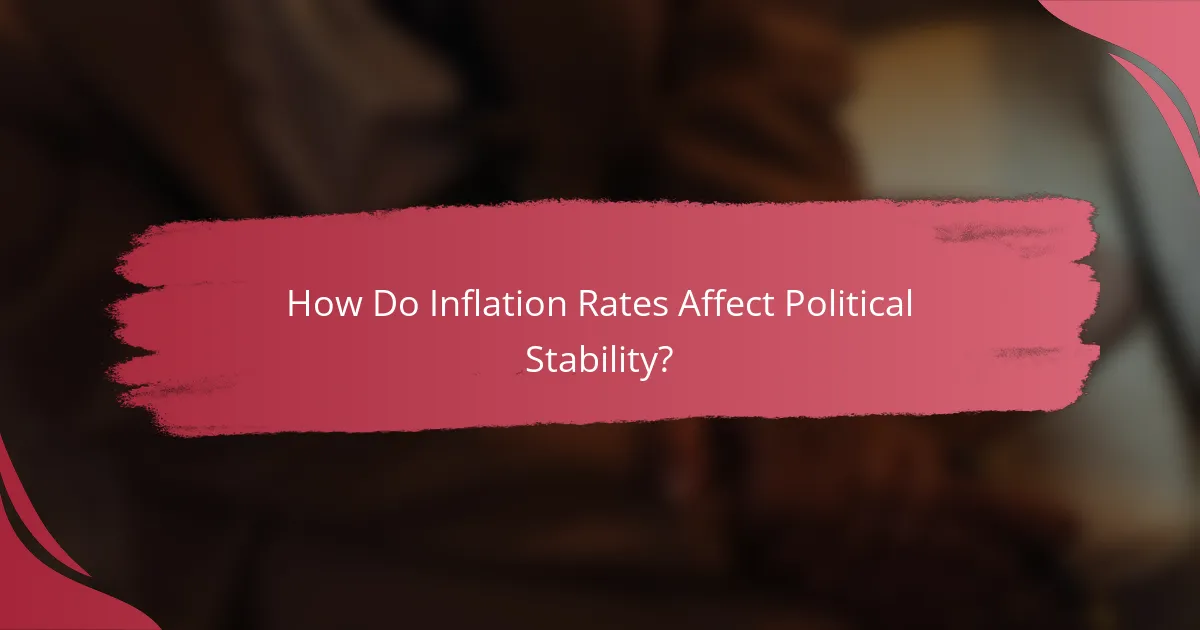
How Do Inflation Rates Affect Political Stability?
Inflation rates significantly impact political stability by influencing economic conditions, social cohesion, and government legitimacy. High inflation can lead to uncertainty, unrest, and a decline in trust towards governing bodies, ultimately destabilizing a nation.
Increased economic uncertainty
High inflation creates economic uncertainty, making it difficult for businesses and consumers to plan for the future. When prices rise rapidly, purchasing power declines, leading to reduced consumer spending and investment. This uncertainty can hinder economic growth and create a cycle of instability.
For example, in countries experiencing hyperinflation, such as Venezuela, businesses struggle to set prices and consumers often hoard goods, further exacerbating the economic situation. This unpredictability can deter foreign investment, which is crucial for economic recovery.
Heightened social unrest
Inflation often leads to heightened social unrest as citizens react to rising costs of living and diminishing quality of life. When basic necessities become unaffordable, public frustration can manifest in protests and demonstrations, challenging the authority of the government.
Historical instances, such as the Arab Spring, illustrate how rising food prices and inflation contributed to widespread protests. Governments may face pressure to respond to these grievances, but inadequate solutions can lead to further unrest and instability.
Impact on government legitimacy
High inflation can undermine government legitimacy as citizens lose faith in their leaders’ ability to manage the economy. When inflation erodes savings and wages, the public may perceive the government as ineffective or corrupt, leading to a decline in support.
In many cases, governments facing high inflation may resort to populist measures or authoritarian tactics to maintain control, which can further erode democratic institutions. Maintaining transparency and addressing inflation effectively is crucial for preserving public trust and political stability.
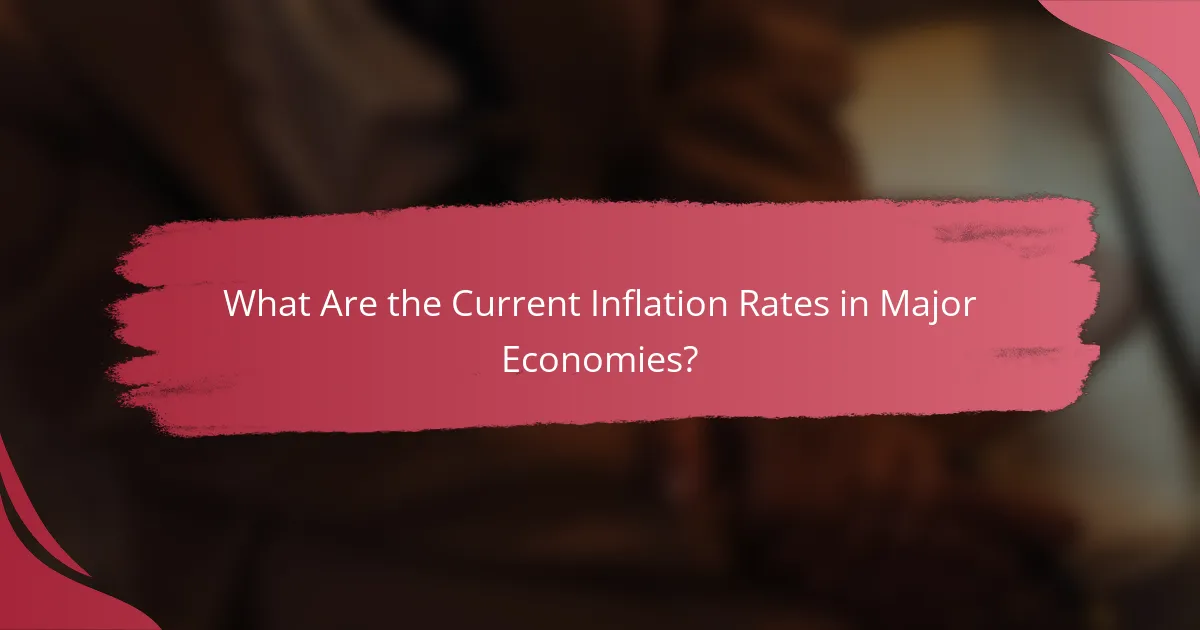
What Are the Current Inflation Rates in Major Economies?
Current inflation rates vary significantly across major economies, impacting purchasing power and economic stability. As of late 2023, inflation remains a critical issue, with rates fluctuating based on various factors including supply chain disruptions and monetary policy responses.
United States inflation rate
The inflation rate in the United States has been hovering around the low to mid-single digits, influenced by factors such as energy prices and consumer demand. The Federal Reserve’s monetary policy plays a crucial role in managing these rates, with interest rate adjustments aimed at stabilizing the economy.
Consumers should be aware of how inflation affects their purchasing power, particularly in essential goods like food and housing. It’s advisable to monitor price trends and adjust budgets accordingly to mitigate the impact of rising costs.
Eurozone inflation rate
In the Eurozone, inflation rates have similarly been in the low to mid-single digits, with variations among member countries. The European Central Bank (ECB) employs interest rate changes to address inflationary pressures, which can lead to differing economic conditions across the region.
Residents should consider the implications of inflation on savings and investments, as higher rates may erode the value of money over time. Keeping an eye on ECB announcements can provide insights into future economic conditions.
Emerging markets inflation trends
Emerging markets are experiencing diverse inflation trends, often ranging from moderate to high levels. Factors such as currency fluctuations, commodity prices, and local economic policies significantly influence these rates.
Investors and consumers in these markets should remain vigilant about local inflation trends, as they can impact everything from investment returns to daily expenses. Understanding the local economic context is essential for making informed financial decisions.
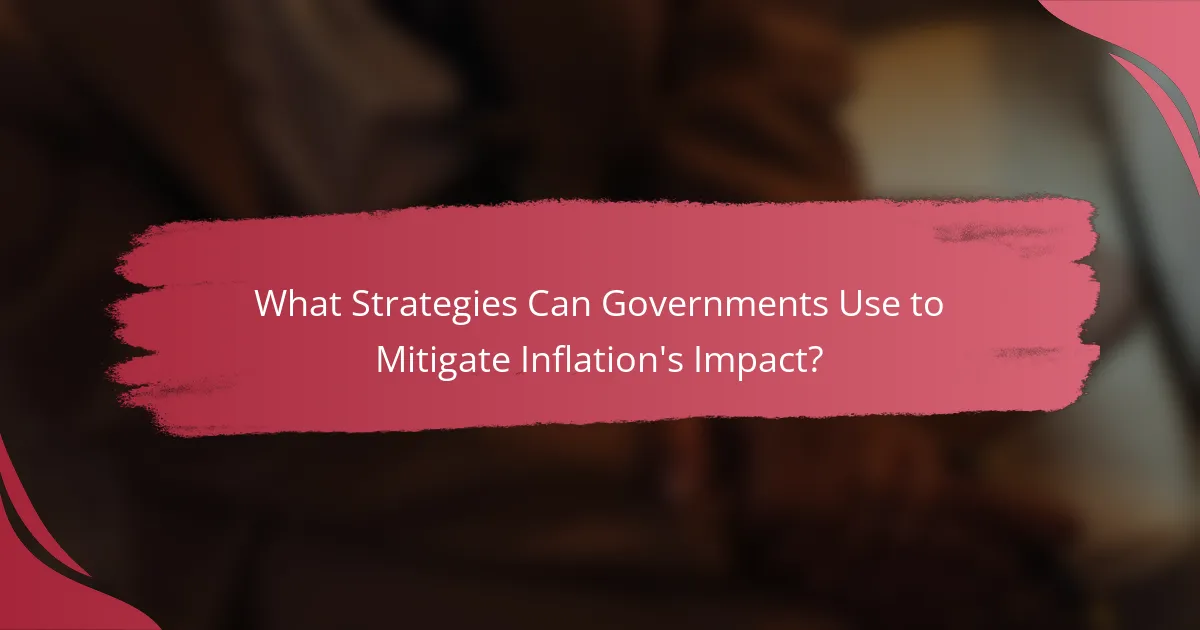
What Strategies Can Governments Use to Mitigate Inflation’s Impact?
Governments can employ various strategies to reduce the adverse effects of inflation on their economies and political stability. Key approaches include adjusting monetary policy, implementing fiscal stimulus measures, and enforcing price controls and subsidies.
Monetary policy adjustments
Monetary policy adjustments involve changing interest rates and controlling money supply to influence inflation. By increasing interest rates, central banks can discourage borrowing and spending, which may help to cool down an overheating economy.
For instance, a central bank might raise rates from around 1% to 3% to combat rising inflation. However, this can also slow economic growth, so policymakers must balance these effects carefully.
Fiscal stimulus measures
Fiscal stimulus measures include government spending and tax cuts aimed at boosting economic activity. By injecting funds into the economy, governments can stimulate demand, which may counteract the negative impacts of inflation.
For example, a government might allocate billions in infrastructure projects to create jobs and increase consumer spending. However, excessive stimulus can lead to higher inflation if not managed properly.
Price controls and subsidies
Price controls and subsidies are direct interventions in the market to stabilize prices for essential goods and services. Governments may set price ceilings to prevent prices from rising too quickly, or provide subsidies to keep prices affordable for consumers.
While these measures can provide immediate relief, they may lead to shortages if prices are kept artificially low. It’s crucial for governments to monitor the market closely to avoid unintended consequences, such as reduced supply or black markets.
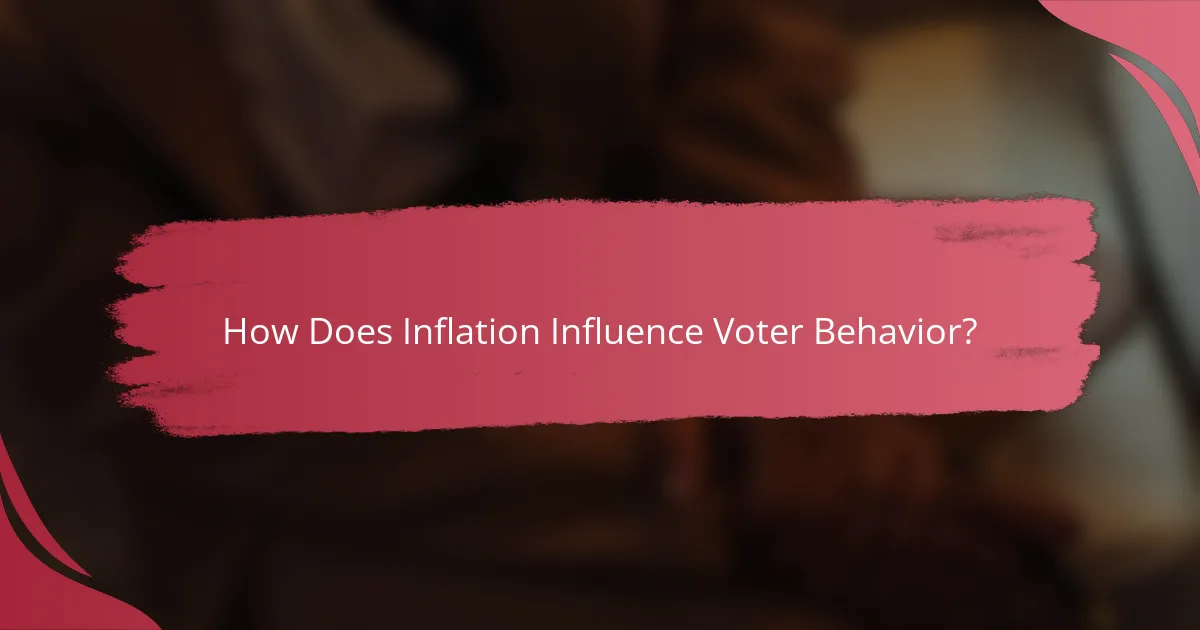
How Does Inflation Influence Voter Behavior?
Inflation significantly impacts voter behavior by shaping perceptions of economic stability and influencing political preferences. As prices rise, voters often seek change, leading to shifts in party support and increased engagement in elections.
Shift in party support
Inflation can lead to a notable shift in party support, particularly when voters feel that their economic conditions are worsening. For instance, if a ruling party is perceived as ineffective in managing inflation, voters may turn to opposition parties promising better economic management.
Historically, during periods of high inflation, parties that prioritize economic reform tend to gain traction. Voters may gravitate towards candidates who advocate for policies aimed at stabilizing prices, such as fiscal discipline or monetary tightening.
Increased voter turnout
High inflation often correlates with increased voter turnout, as economic distress motivates citizens to participate in elections. When inflation erodes purchasing power, individuals are more likely to vote for candidates who address their financial concerns.
For example, in countries experiencing significant inflation, turnout rates can rise by several percentage points compared to more stable economic periods. Engaging in the electoral process becomes a way for voters to express dissatisfaction and demand change from their leaders.

What Role Does Media Play in Shaping Public Perception of Inflation?
The media significantly influences how the public perceives inflation by reporting on economic conditions and framing discussions around them. Through various channels, including news articles, broadcasts, and social media, the media can either amplify concerns or mitigate fears regarding inflation’s impact on daily life.
Reporting on inflation statistics
Media outlets often present inflation statistics that can shape public understanding and sentiment. For instance, when inflation rates rise, headlines may emphasize the percentage increase, which can lead to heightened anxiety among consumers. Conversely, if the media highlights stable prices or lower inflation rates, it may foster a sense of economic security.
It is crucial for consumers to critically evaluate how these statistics are reported. Look for context in the data, such as comparisons to previous years or explanations of underlying factors affecting inflation, to gain a clearer picture of the economic landscape.
Influence of political commentary
Political commentary in the media can significantly sway public perception of inflation by linking it to government policies and leadership effectiveness. Commentators may argue that high inflation reflects poorly on current administration decisions, which can lead to public discontent and calls for change.
Viewers should be aware of potential biases in political commentary. It is beneficial to seek diverse viewpoints and consider the motivations behind specific narratives, as this can provide a more balanced understanding of inflation’s implications for economic stability and governance.
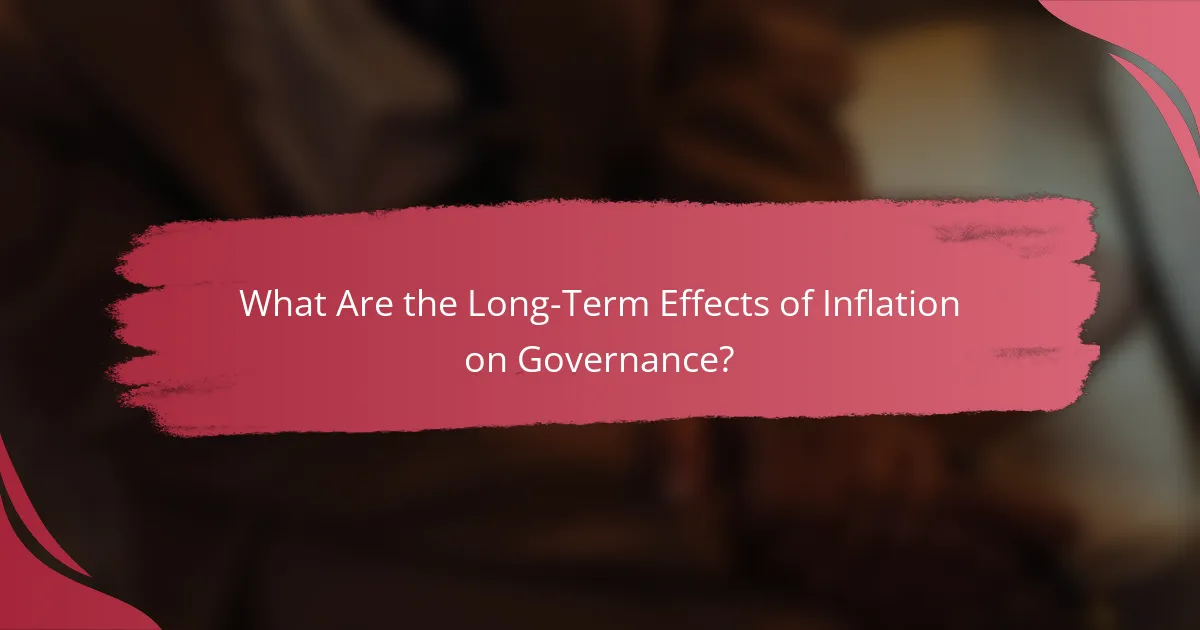
What Are the Long-Term Effects of Inflation on Governance?
Long-term inflation can significantly undermine governance by creating an environment of uncertainty and instability. As prices rise, governments may struggle to implement effective policies, leading to challenges in maintaining order and public confidence.
Policy instability
Inflation often leads to policy instability as governments react to rising costs and public discontent. Frequent changes in economic policies can create confusion and hinder long-term planning for businesses and citizens alike. For instance, a government may abruptly alter tax rates or subsidies in response to inflationary pressures, which can disrupt economic growth.
Moreover, when inflation is high, policymakers may prioritize short-term fixes over sustainable solutions. This can result in a cycle of reactive measures that fail to address the root causes of inflation, further eroding public confidence in governance.
Changes in public trust
As inflation persists, public trust in government institutions can decline sharply. Citizens may perceive their leaders as ineffective or disconnected from the realities of everyday life, especially if wages do not keep pace with rising prices. This erosion of trust can lead to increased social unrest and political polarization.
To rebuild trust, governments must engage transparently with the public about inflationary challenges and the measures being taken to address them. Clear communication and consistent policy actions can help restore confidence, but failure to do so may result in long-lasting damage to the relationship between the state and its citizens.
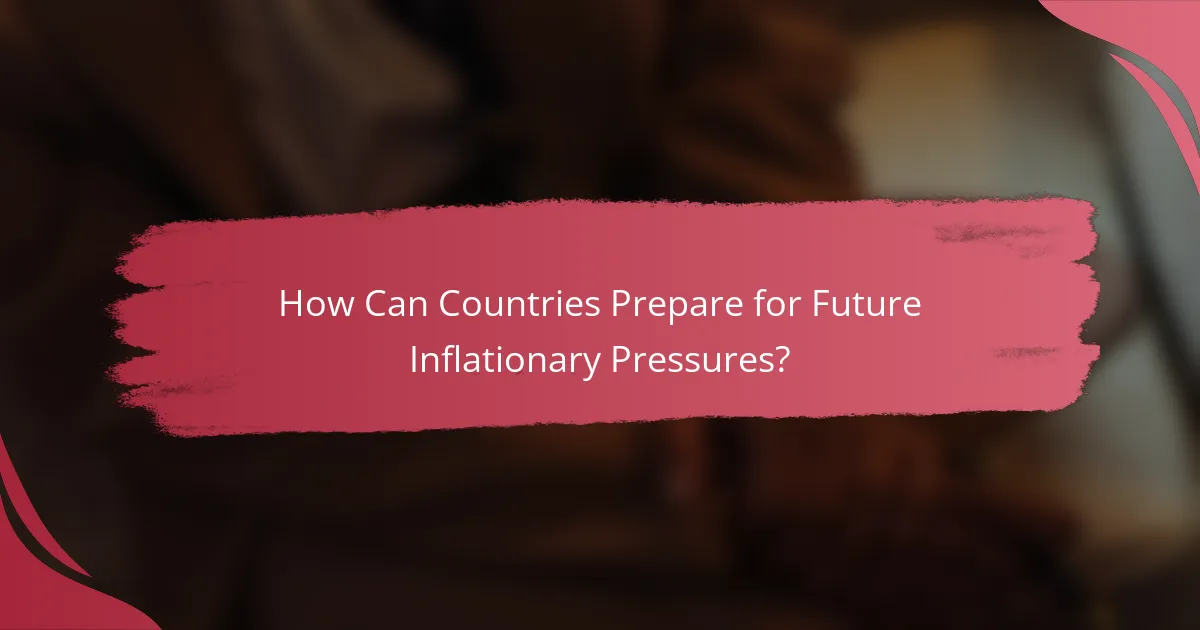
How Can Countries Prepare for Future Inflationary Pressures?
Countries can prepare for future inflationary pressures by implementing proactive economic policies, enhancing fiscal discipline, and fostering a resilient supply chain. These measures help stabilize prices and maintain public trust in economic governance.
Strengthening Monetary Policy Frameworks
Countries should focus on strengthening their monetary policy frameworks to effectively manage inflation. This includes setting clear inflation targets and utilizing tools such as interest rate adjustments and open market operations to control money supply. For example, central banks may raise interest rates to curb excessive spending during inflationary periods.
Additionally, maintaining transparency in policy decisions can enhance credibility and public confidence. Regular communication about inflation expectations and economic outlook can help manage market reactions and stabilize consumer behavior.
Diversifying Supply Chains
Diversifying supply chains is crucial for mitigating the impact of inflation. By sourcing materials and products from multiple suppliers and regions, countries can reduce dependency on single sources that may be vulnerable to price shocks. This strategy can help stabilize costs and ensure a steady supply of goods.
For instance, countries can encourage local production and invest in alternative suppliers to buffer against global market fluctuations. This approach not only helps in managing inflation but also boosts local economies.
Implementing Fiscal Policies
Effective fiscal policies play a significant role in preparing for inflation. Governments can prioritize spending on essential services and infrastructure while avoiding excessive borrowing that may lead to inflationary pressures. Maintaining a balanced budget can help ensure long-term economic stability.
Furthermore, targeted subsidies or tax relief for vulnerable populations can alleviate the immediate effects of rising prices. These measures can help maintain social stability and prevent unrest during inflationary periods.
Enhancing Consumer Protection
Strengthening consumer protection laws is vital in times of inflation. Governments should ensure that regulations are in place to prevent price gouging and unfair business practices. This can help maintain public trust and protect consumers from excessive price increases.
Additionally, educating consumers about their rights and available resources can empower them to make informed decisions. Awareness campaigns can guide consumers on how to navigate inflationary environments effectively.
